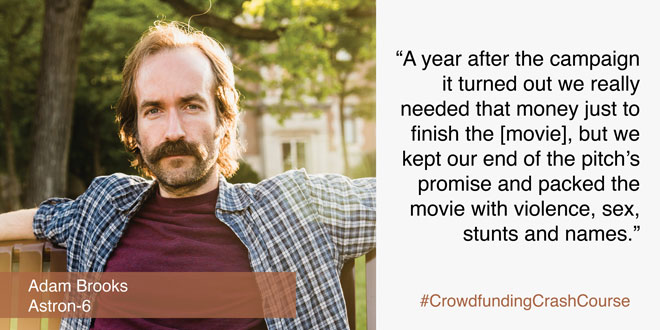March 2015
Crowdfunding Crash Course: Meghan Athavale of POMO Inc - Lumo Play
- by Alyson Shane
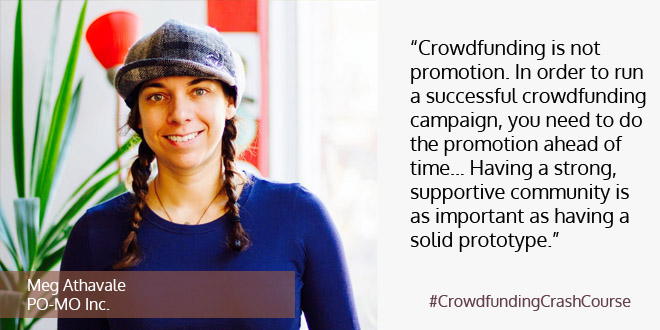
Meghan Athavale is an entrepreneur and artist. She is the co-founder and CEO of Po-Motion (PoMo) Inc and Lumo Play.
She is currently running an Indiegogo campaign to crowdfund the LUMO Interactive Projector.
Can you briefly describe Lumo?
Lumo is a turnkey gaming and display system that includes a projector, a sensor that captures motion data, and an Android processor. It projects games you would normally play on a touchscreen onto the floor of a child’s playroom, so they can play by jumping, moving, waving their arms and running. It also works as a regular projector, so you can play movies with it, and non-motion reactive games (using a bluetooth controller.) Finally, Lumo has an online content creation suite designed so that young children can customize games using their own artwork.
Why did you feel that the crowdfunding model was the best way to promote Lumo?
We’ve been seeking investment for Lumo for about a year. It’s tough to get investment for hardware, and even tougher if your company is based in a place with very little access to VC communities. VCs only fund about 1% of the deals they see. Here’s a great article explaining why: http://www.startupcfo.ca/2012/08/top-10-signs-your-business-is-not-vc-fundable/
Lumo doesn’t have traction yet, because it isn’t for sale yet. It’s not for sale because we need funding to produce it. We know people want it, but we don’t know how many people want it yet. Crowdfunding, in our case, is a great way to allow our market to tell us what they want in terms of features and price point, without the risk of spending hundreds of thousands of dollars producing a bunch of Lumos first.
Having said that, crowdfunding is not promotion. In order to run a successful crowdfunding campaign, you need to do the promotion ahead of time. We learned that when our first attempt on Kickstarter failed epically.
Why and how did you choose Indiegogo over other crowdfunding options available?
We did Kickstarter in September 2013 with a very very early stage prototype and no marketing. It still raised around $25,000, but it wasn’t enough to move the project forward, so we regrouped and joined a 4 month incubator, visited China, and hired some engineers.
We’re now launching on Indiegogo for two reasons. 1) they have a partnership with the hardware incubator we attended, so we got a lot of support regarding pre-campaign prep and marketing for our upcoming launch (we couldn’t even get a contact email from Kickstarter) and 2) The flexible funding option makes sense for us right now. We can make 10 Lumos or we can make 10,000 Lumos, depending on market demand. We don’t have to meet our goal to move forward. That wasn’t the case in 2013.
How big was your budget before you launched your crowdfunding campaign?
The first campaign had no budget. In total we’ve spent around $5000 in marketing activities this time. This includes attending SXSW, running facebook ads, and running a contest using a tool called Gleam.
How far along was your project before you felt ready to launch a crowdfunding campaign? In hindsight, would you have preferred to be farther along, or to have crowdfunded earlier?
The first campaign, on Kickstarter, wasn’t nearly far enough along. In retrospect I would have waited until we had a prototype that was only a few steps from DFM (design for manufacturing). We have that now.
More importantly, though, I wish I’d spent a year reaching out to people and building a community before launch. Having a strong, supportive community is as important as having a solid prototype.
Can you explain how you prepared for and managed your campaign?
The first campaign was a one-person show. I had some help making a few games and shooting the video, but overall the whole thing was my personal learning experience. This time we have a delegation process. Someone is in charge of the video. Someone else is in charge of design. I am in charge of PR and marketing, and the developers can focus on making the thing work.
What tools did you use to market your campaign?
I only used social media and local news coverage on my last launch. We managed to get a big spread story in the Globe and Mail that went out a week before our campaign went live.
This year I used Gleam, Thunderclap, fb ads, and attended a pile of events and conferences. I also believe in old-school hustle, so I invite parents and families in the Los Angeles area to come hang out with me and play with Lumo. The best way to build supporters is to actually show them your product and meet them in person, I find.
What was your biggest challenge during your campaign? What could you have done differently?
The biggest challenge with the Kickstarter was exposure. We also didn’t really know what our marketing message was at that point.
I think the biggest challenge on the upcoming campaign will be keeping up with correspondence. We are already getting tons of calls and emails, and there’s really only two people on hand to answer them.
We have a list of over 30 people on standby to help us if we need them.
In retrospect what were your best assets for running your original campaign? Since you’re launching another campaign soon, how do you plan to apply these lessons this time?
The best thing we did with our original campaign was saving the email list and keeping up with the original community. They are our biggest advocates, since they know how far we’ve come.
What’s the most valuable advice you could share with aspiring crowdfunders?
Keep a very open mind, spend as much time as possible building an email list, and don’t be afraid to ask for help. You are about to ask hundreds of strangers for their money. You should get used to defending yourself in the nicest possible way, which means you will have to talk to hundreds of people before you launch to get your messaging and language right.
If your campaign isn’t going well, shut it down and try again later. If you let it run it’s course and fail, you will have a dead skeleton of a kickstarter haunting the interwebz for all eternity (like we do). It’s totally okay to shut down early, regroup, and try again. Your community will understand. They want you to succeed.
This post is part of the #CrowdfundingCrashCourse series. You can find the entire series of interviews and summary posts here.
Ladies Learning Code Winnipeg
- by Alyson Shane
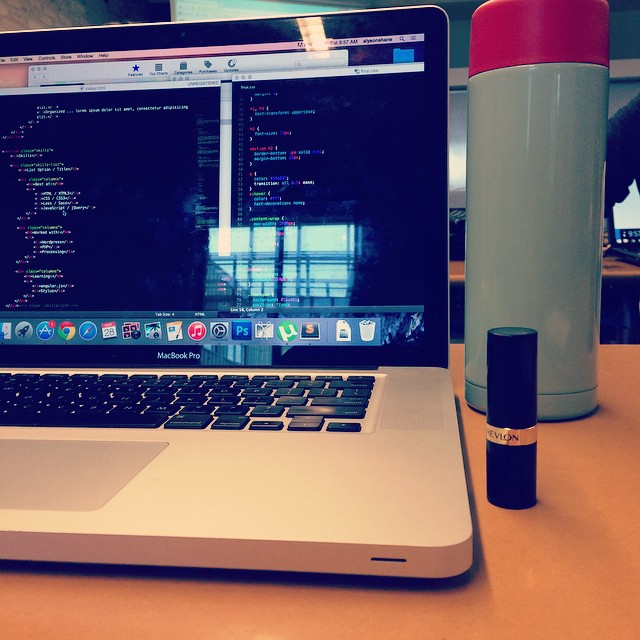
Saturday instead of sleeping in and eating croissants (as I usually do on a Saturday) I spent my morning brushing up on my HTML and CSS skills at the "CSS for Beginners" class held by the Winnipeg chapter of Ladies Learning Code, a nonprofit that promotes digital literacy for women and youth.
While I'm pretty well-versed with a lot of digital tools, front-end development isn't somewhere that I've really spent a lot of time sinking my teeth into, though some of you longtime readers might remember my brief stint with CodeAcademy last year where I made this masterpiece:
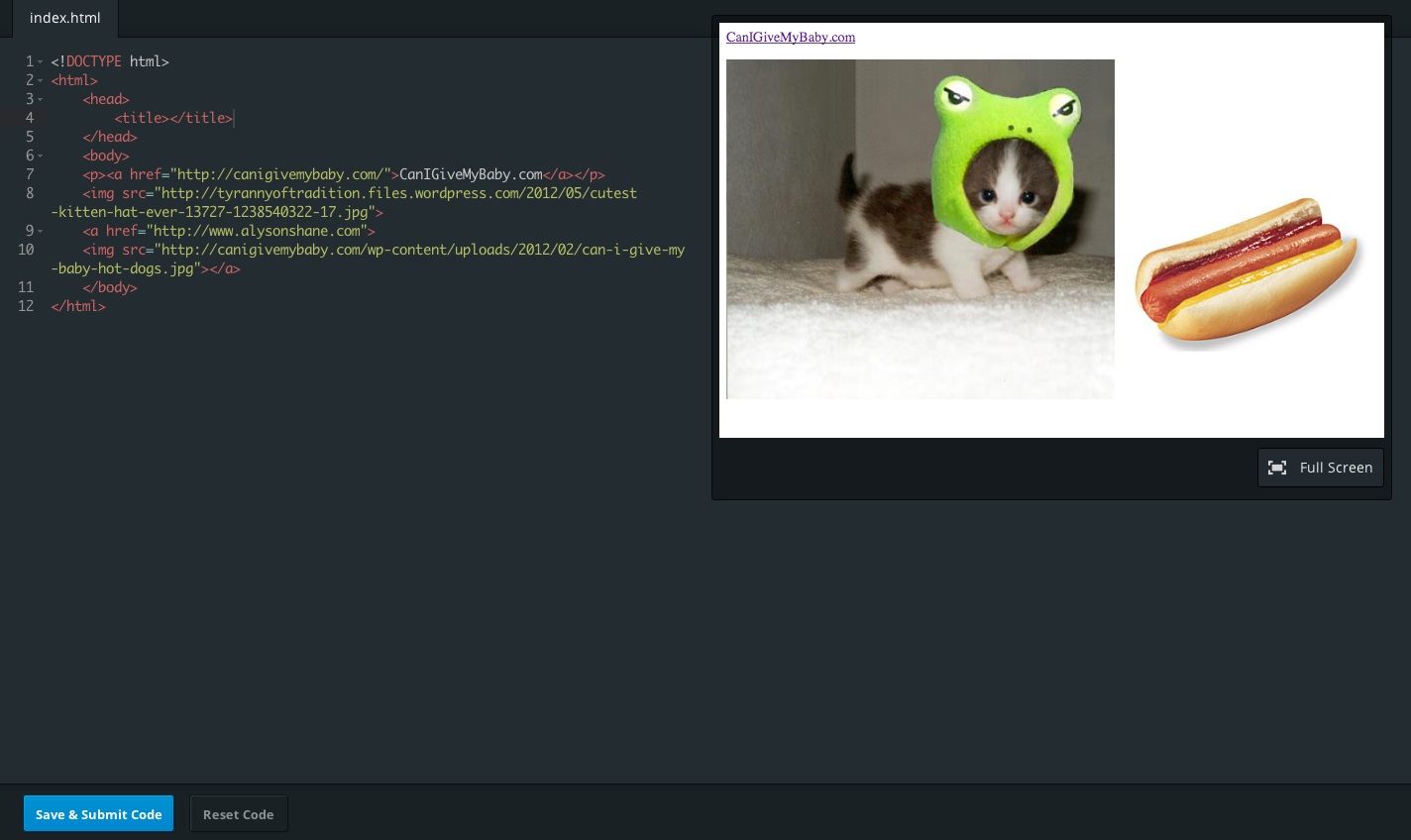
Shortly thereafter life started to really ramp up in other ways, so CodeAcademy sort of fell by the wayside. As such, I was really excited to be able to have another opportunity to spend some time getting to know what actually goes into making a website look (and operate) fabulously.
I spent the day cramming tons of information about style sheets, rule sets, declarations, values, elements, and tons of other topics into my eager little brain along with a packed classroom full of other lady-learners.
At one point we went around the room and introduced ourselves and briefly discussed our motivations for attending, and it was amazing to see all these women, many from extremely different walks of life, coming together to learn something completely new together.
Our instructor, Brad, was knowledgable and peppered the informational slides with silly gifs that lightened the mood when we were tackling a difficult concept, and there were plenty of mentors who were not only super-clever, but also displayed more patience with cleaning up our messy code than I ever thought a person could have.
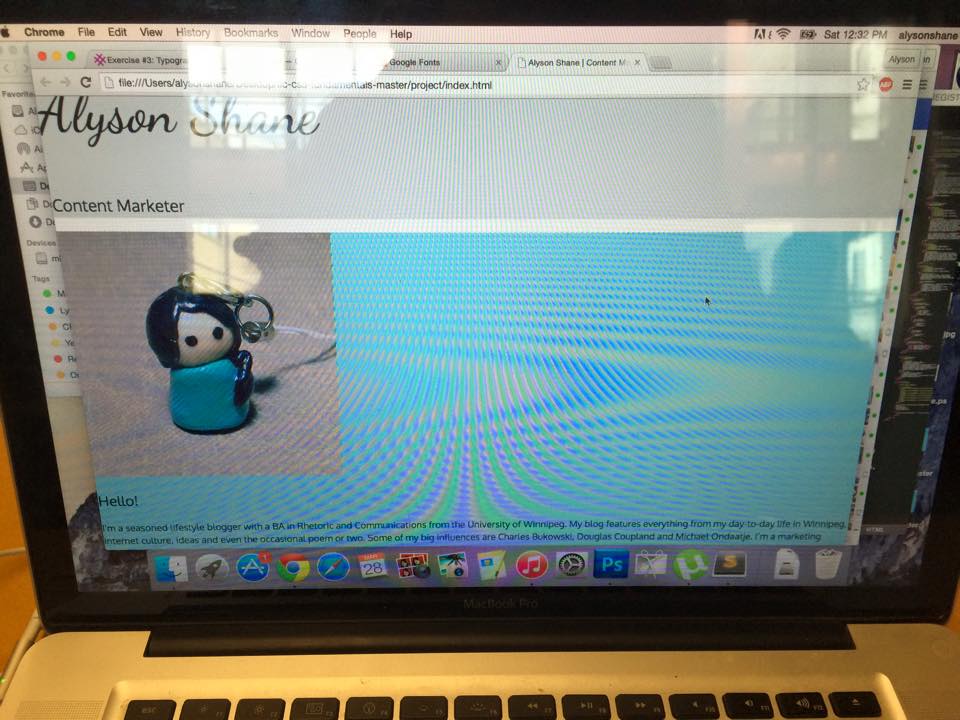
If there's anything that I've taken away from that experience it's that coding takes a lot of patience. Suddenly I have way more respect for John's day job, eek!
Overall it was a really positive and informative experience, and it's encouraged me to start exploring the ways in which being able to have a better understanding of different coding languages can help me provide better services for my clients.
Big thanks to Michelle and Jessica from Ladies Learning Code for putting together such a great day, and for inviting me to participate!
5 Questions to Ask Yourself About Your Marketing
- by Alyson Shane
The other day while out with my friend Kenton we got to discussing the freelance market, and how more and more businesses are turning to freelance content marketers to help them with their marketing needs.
One of my big takeaways from that conversation was that many business owners don't know when to start "letting go" of certain aspects of their business. As in, they spend way too much time doing (or neglecting) important things that they could simply outsource, even when it becomes detrimental to their business.

With that in mind, I figured I'd put together a short list of questions to ask yourself if you're a business owner who might be trying to shoulder too much of their business burden:
1. When did I last update my website?
While tools for building websites aren't in short supply, maintaining one which is accurate, up-to-date, compelling, mobile-friendly, and SEO-optimized requires more than just a landing page with a picture. A great website needs to do more than just look good - it needs to drive conversions like calls, emails, leads and customers, which includes ongoing investment in SEO content, structure and metadata.
Follow-up Questions:
- Do I want to spend time worrying about updating my website?
- Do I stress about creating engaging content?
- Am I strong enough writer to create content quickly and efficiently?
2. Do I want to keep up with SEO?
Staying up-to-date with the constant changes in Search Engine Optimization is among the most complex aspects of online marketing. It requires keeping tabs on which search engines people are using the most and ensuring that your website and web presence perform well on search-engine results pages after these updates.
Follow-up Questions:
- Does looking at SEO information make me go cross-eyed?
- Am I more interested in running my business than managing where it shows up on Google?
- Am I willing to spend the time to keep up-to-date with new SEO changes?
3. Am I getting results from my search engine advertising?
Techniques like Google AdWords can be one of the easiest and most cost-effective ways of generating new prospects, but if you've ever tried it you know that it requires much more than signing up, setting a text ad and waiting for the customers to roll in.
You need effective, compelling text that drives searchers to an optimized, relevant landing page, and a knowledge of your target audience so you're spending your money on driving visitors who are likely to buy from you. Understanding how to do this requires daily maintenance and analysis.
Follow-up Questions:
- Do I have the time to dedicate to analyzing and refining my campaigns to yield better results?
- Do I know what Google Pigeon is? Do I care?
4. Is my social media fan base my target audience?
You've signed up for a Facebook page and you've got a handful of 'Likes' - but what does that mean, exactly? Are you concerned in vanity numbers (aka, how many 'Likes' you have) or are you looking deeper at what sorts of people have shown an interest in your page?
How often are you looking at things like how many of your fans and followers are even in your immediate service area? How regularly are you updating your sites with relevant, interesting content that engages followers on your social media platforms? How are you leveraging paid advertising opportunities on these sites?
The key to successful content marketing is creating content that generates word-of-mouth and site traffic which boosts your website's SEO.
Follow-up Questions:
- Do I really know how to reach out to my target audience?
- Am I engaging with the right people?
5. Do I know my marketing ROI?
Anyone can pull together charts and graphs which show likes, follows and visitors to your site, but when you look at these numbers and figures, do you know how to make sense of the information there? Do you know how to translate this information into steps that will help your business grow?
Follow-up Questions:
- Do I want to look at daily, weekly, and monthly analytics to pull information from them and then apply them across all all of my marketing efforts?
- Does trying to make sense of my marketing efforts seem like more work than I want to do?
Do you recognize any of these signs as ones that indicate that you might need to start outsourcing your marketing? If not, do you think it's valuable to outsource your marketing? I'd love to know!
-----
Want to keep up with my posts about copywriting, social media and content marketing? Sign up for my newsletter and get them delivered right to your inbox!
Crowdfunding Crash Course: Adam Brooks of Astron-6 - The Editor
- by Alyson Shane
Adam Brooks is an actor, writer and founding member of Astron-6, a Winnipeg-based film production company. They used Indiegogo to crowdfund their film The Editor.
Can you briefly describe The Editor?
Yep. It’s an absurdist giallo movie about a film editor suspected of murdering a number of his co-workers in a film studio in the late 1970s.
Why did you feel that the crowdfunding model was the best way to promote the film?
Because it required the least investment for the highest gain - nothing to lose.
Why and how did you choose Indiegogo over other crowdfunding options available?
I didn’t spend much time researching it but they seemed to keep a smaller chunk for themselves than their competition.
How big was your budget before you launched your crowdfunding campaign?
$120k.
How far along was your project before you felt ready to launch a crowdfunding campaign? In hindsight, would you have preferred to be farther along, or to have crowdfunded earlier?
It’s a bit of a long and boring story - we had started to shoot ‘The Editor’ as a fake trailer on SLR and eventually decided we might as well try to make an actual feature out of it. We wrote a script and applied for telefilm’s microbudget program.
Can you explain how you prepared for and managed your campaign?
We brainstormed a list of rewards minutes before taping the pitch video and then uploaded it to indiegogo and posted it all over our social media.
What tools did you use to market your campaign? Do you feel like you did so successfully, and if not, what could you have done differently?
We've built a small audience already, so all the blogs that had previously taken an interest in our material were happy to post the indiegogo without us asking.
I think it was successful - we exceeded our goal.
In retrospect what were your best assets for running this successful campaign? On the other hand, what would you do differently?
I think you need a cool project, and cool rewards…. I really wish I’d budgeted all the postage I’ve had to spend on the rewards though or budgeted to pay somebody to do it for me.
What was your biggest challenge during your campaign?
I don’t know. We already had $120k. Our campaign was just trying to get us an additional $16k to punch up what we already had. A year after the campaign it turned out we really needed that money just to finish the thing, but we kept our end of the pitch’s promise and packed the movie with violence, sex, stunts and names.
What’s the most valuable advice you could share with aspiring crowdfunders?
Make a comic with the Soskas.
This post is part of the #CrowdfundingCrashCourse series. You can find the entire series of interviews and summary posts here.
Smiling With My Teeth
- by Alyson Shane
I was going back through some old photos the other day and I noticed a trend that I think a lot of people fall into: I was making the same face in every photo.

See what I mean?
Going back farther, I noticed that I had the habit of making what I refer to as the "Ugly Girl Face" - aka, a generally grotesque or distorted face in photos.
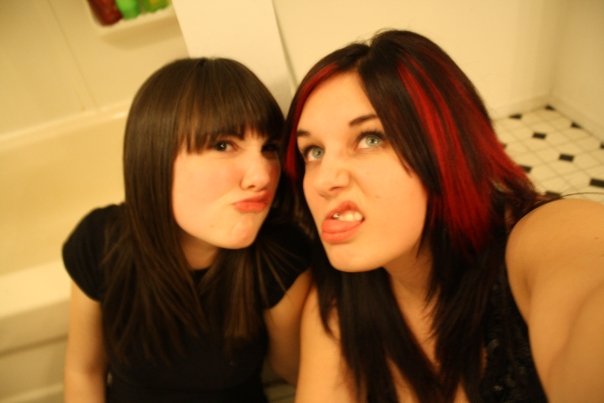
This face, referred to as the "After Hours Sex Face" thanks to a video that I'd seen online, was one that I pulled because I didn't like how I looked in photos. I felt self-conscious about my hair, my makeup, my personality, and most importantly my weight.
Making the AHSF was my way of drawing attention away from aspects of myself that I was uncomfortable with; I was able to hide behind it, even in photos.
After a while I started to grow up and become more confident and the AHSF (thankfully) became a relic only available in old, old Facebook albums.
Except around this time another trend emerged: I started making the same face in every photo.
If you look at photos of me from 2010-2013, I make the same face in almost every picture: head cocked to the side, close-lipped smile, etc.

While these photos don't necessarily make me look bad (that would defeat the purpose) they certainly don't express my personality in any memorable way.
Then, around mid-2014 this started to change. I started smiling with my teeth, laughing in photos, and sharing images of myself that didn't look totally posed and put-together. In fact, my "candid" laugh photos started to rapidly become my favourite pictures.
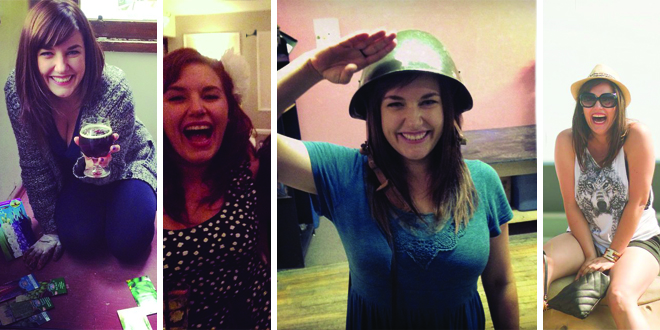
The more I thought about this shift, the more I realized that the way that I smiled in the photos was indicative of how comfortable I was with myself: I've spent the last year going through some major emotional and personal changes, which seem to have manifested themselves in a way that I hadn't previously thought about.
I realized that over time I had gone from one extreme to another: distorting my face to mask how I felt about myself deep down, to accepting who I was and sharing it with a huge burst of laughter and a smile.
It makes me wonder about women who pull faces in photos, or strike the same pose in every group photo. Is this what, subconsciously perhaps, is going on? Why do we worry so much about how people perceive these photos of ourselves?
Have you noticed changes in how you present yourself in photos over the years? If so, why do you think that is? Let's discuss!
Introducing: the Crowdfunding Crash Course!
- by Alyson Shane
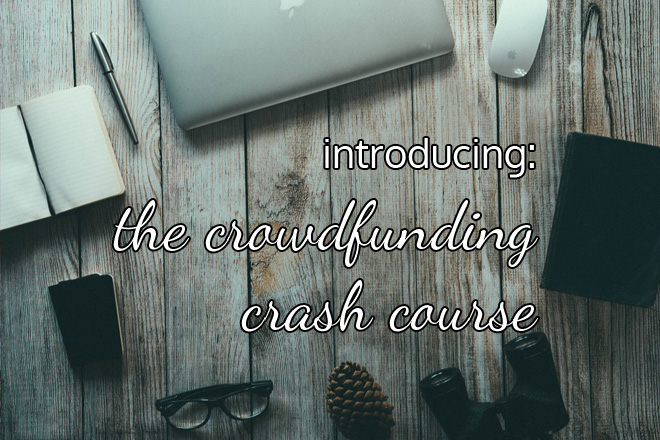
The other weekend John and I finally sat down and watched Indie Game: The Movie. This amazing piece of cinema is from Canadian filmmakers James Swirsky and Lisanne Pajot. It follows indie video game developers as they struggle to develop and release Super Meat Boy and Fez, respectively, as well as interviews with Jonathan Blow, the developer behind Braid.
James and Lisanne ran two successful crowdfunding campaigns to fund the film, and after the movie I got to wondering: what makes a crowdfunding campaign successful?
Having never run a crowdfunding campaign myself, I figured that the best way to gain a deeper understanding of this booming phenomenon was to seek out knowledge from those around me.
With that in mind, I'm launching the #CrowdfundingCrashCourse project, where I'll be interviewing startups, musicians, businesspeople, and anyone else I can find who can share their experiences about running a crowdfunding campaign.
The first post, which will go up this week, is with Adam Brooks of Winnipeg-based film production company Astron-6, who used Indiegogo to crowdfund their movie The Editor.
I'm really excited to be starting this project and to share it with you and am always looking for new participants to share their knowledge. If you've run a crowdfunding campaign, or know someone who has and should be featured as a part of this project, please feel free to give me a shout.
This post is part of the #CrowdfundingCrashCourse series. You can find the entire series of interviews and summary posts here.
You Are Not Your Place of Work
- by Alyson Shane
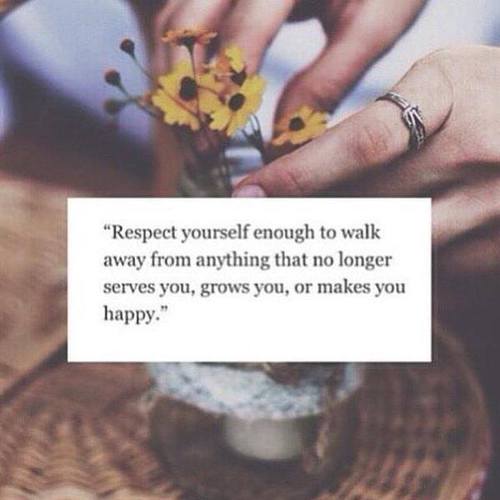
I read an interesting article on Lifehacker today called "The Company You Work for is Not Your Friend" which really struck a chord with me based on an experience that I had right out of university.
I started working for a "business incubator" taking care of their marketing and B2B advertising. They had created the position, which supported the Director of Sales, shortly before hiring me and as such my position didn't have clearly-defined work parameters. This was one of the things that excited me about the position: the ability to use it to grow and make it into my own.
I had spent time and effort pouring myself into the position; trying to help the company and it's clients become more organized and streamlined in their processes. I sat in on extra meetings, just so that I could gain a better understanding of the process. I showed up early and stayed late.
As such, when they let me go after a mere 30 days my starry-eyed, newly-graduated self was caught totally off-guard. Actually, to put it more truthfully, I was devastated.
Clearly something had gone wrong here, but what? What had I done that had led to this decision?
I decided to reach out to my former boss to get some answers.
I called him and left a friendly voicemail thanking him for giving me the opportunity to have worked for him, and asking for a quick chat to clarify what I could do better in my future roles. After a few days I followed up with an email, which was met with even more silence.
In the meantime I found a new job, but I was still distraught. How could I move on from this past experience without learning what I could have done better?
Eventually, close to two months after I was let go, my former boss sent me a terse email making vague excuses about not getting back to me (he lost my phone and his email also stopped working for two months) and essentially stated that he hadn't thought out the parameters of the job before hiring me, and felt that it was in his (and his company's) best interests to let me go rather than work with me to develop the position, despite the fact that this was the original goal when I was hired.
It was then that reality really sunk in: no matter how hard I had tried, no matter how much effort I had put in, it wouldn't have worked out. Not only that, but my ability to learn a lesson and to grow from the experience mattered so little to this person that he put off getting back to me for an egregious amount of time.
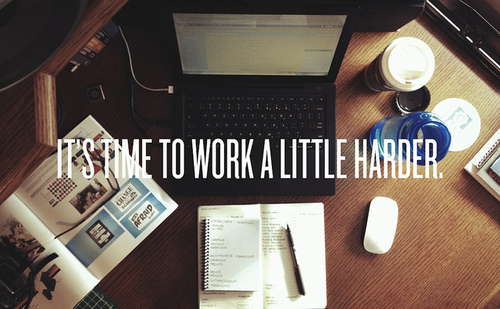
This flew in the face of everything that I had grown up thinking. My parents, and to some extent my formal education, had taught me that if I busted my ass my bosses would always see it and I would always have a safe, secure place within the company I worked for. As such, I went into the situation blindly, assuming that if I just worked hard and did my best, that the fruits of my labour would be rewarded with a long and happy employment.
Obviously this was not the case, and it isn't for many people.
In a way, though, I was lucky to have learned this lesson right out of the gate; many people spend their lives working for a company, only to be laid off during tough times or let go because of personality conflicts with new management. No amount of dedicated work can change the economy or stop someone from being an asshole. You have to cover all your bases.
In the years since, while I've continued to be employed full-time at a 9-5 job, I've made a directed and deliberate effort to maintain my professional network, to keep my resume updated, and to continue to pursue things like freelance work and speaking opportunities which add to my professional portfolio.
Not because I expect to get fired anytime soon, but because I want to have control over my own career and the direction that I want my life to take. Part of that requires being prepared to do so.
Because at the end of the day the only person who is truly dedicated to making your career a successful one, is you.
The Do's & Don'ts of "The Approach"
- by Alyson Shane

Recently I had an encounter which really bothered me: I was sent a very generic email from one of those "job board"-type websites; namely one where freelancers can post their profiles and bid on jobs posted by people looking for help.
Generally I don't use these websites, as aggressively bidding for a contract doesn't generally foster the kinds of trustworthy, friendly relationships that I want to establish with my clients (but that's just me). Either way, this wasn't what bothered me enough to write about it.
What set off red flags was that he mentioned seeing my profile on a content marketing website where I've never registered as an active user. I double-checked to make sure that there wasn't a fake Alyson Shane trolling around it's user base and, as I suspected, no such profile existed.
I have no idea why he decided to add this untrue statement to his email, but it definitely rubbed me the wrong way and I sent him a polite reply thanking him for his time and stating that I wasn't interested in using his job board at this time. End of story, right?
Or not.
A few days later I received another email, from someone at a different email address, asking me if I was looking to take on new freelance work. I always am (shameless plug, let's work together!) and I sent back a friendly reply asking about what sort of work he wanted to do together.
The reply I got was something like this:
"It's great that you're looking for new freelance work! Why don't you try posting on our job board at [website name here]?"
After some quick digging I realized that this was a different person associated with the same website that had sent me the weird, generic, obviously-not-researched at all email a few days prior.
This isn't the first time that I've encountered people who approach me this way, and I'm sure it won't be the last, but I wanted to make a quick list of Do's & Don'ts when approaching someone to give you their business, or to collaborate with you in some way, because these simple rules seem to elude some people:
Don't
Be shady. Like the example that I outlined at the beginning of this post, it's disrespectful to try and weasel someone into using your service or working on a project with you. Be honest.
Assume you know better. If someone declines to work with you, don't send a snarky reply insinuating that they will be doing their audience or reputation a disservice.
Leave a million messages. If you call and someone is unavailable, leave a short voice mail (or follow-up email) and wait a reasonable amount of time before calling again. 5-6 voice mails in the span of a few hours is unacceptable unless your house is on fire.
Expect people to work for free. Most of the time you can expect to pay for people's services and their time. There are some exceptions to this rule, but they are situational and can be negotiated in the moment. Don't reach out expecting for free work or promotions.
Do:
Do your homework. Read their blog, follow them on Twitter, add them on LinkedIn, whatever you feel is necessary to gain an understanding of who they are and what they do.
Be professional. See above. It's not okay to send nasty emails to people just because they didn't give you the response that you were looking for.
Be Clear. People can't help you solve your problems if you can't articulate them. Skip emails full of buzzwords and get straight to who you are, what you do, and what you need.
Be Available. If you've scheduled a specific time to have a phone call or Skype meeting, give some notice if you will be unavailable and, if you can reschedule, make a point to be available at that time. Other people's time is as important as yours, so try to be available when you say you will.
Email whenever possible. This is more of a personal preference, but personally I find that sending an email (or filling out a contact form) is much more respectful of my time and allows me the opportunity to do a bit of research before responding. This way I can be prepared.
See? It's easy! By following some simple rules we can make every interaction a much more respectful and pleasant one!
Do you have Do's or Don'ts to add to this list? I'd love to hear them!
The Influence of Natural Mentions
- by Alyson Shane
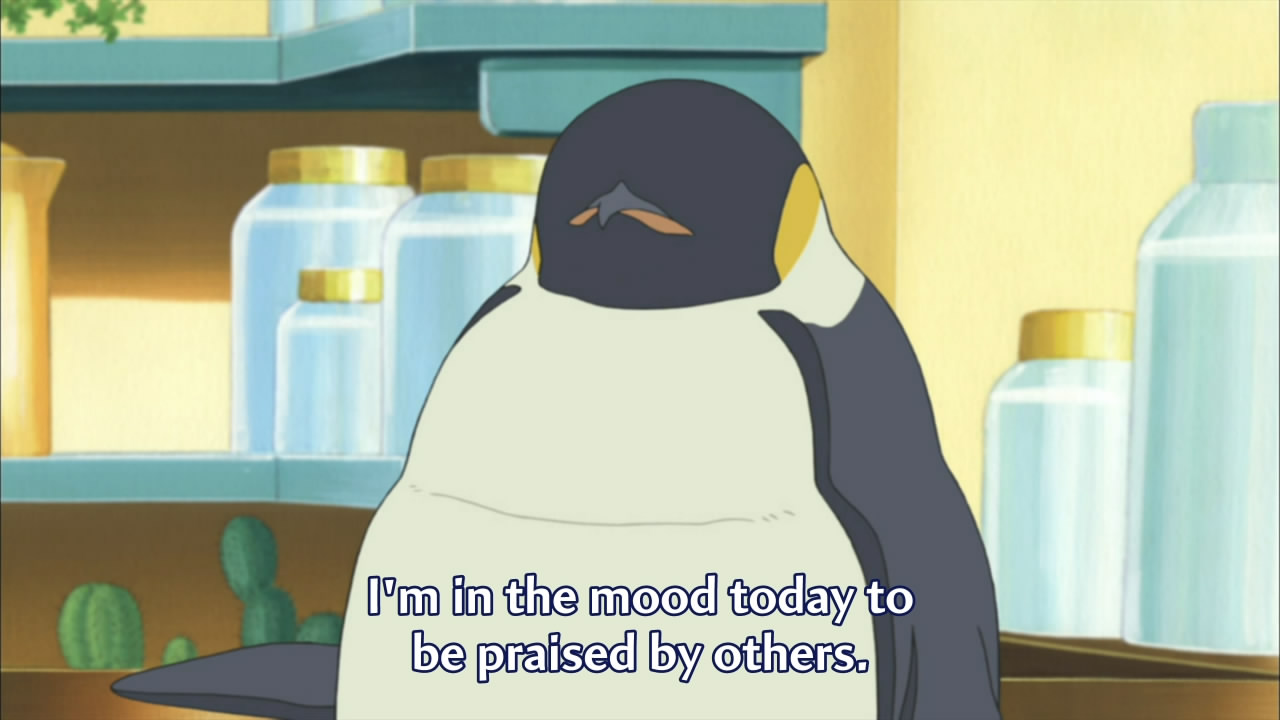
Last week I was involved with the #blogchatca on Twitter, and one of the things that we discussed was how brands understand what you do. Namely, whether or not they "get" your personal brand.

Since my tweet (pictured above) I've been thinking about how my personal brand is perceived online, and how people know that I'm the sort of person that they want to work with beyond just my About Me page.
The answer is simple: natural mentions. The more positive mentions there are of you online, the more readily people will accept these statements to be true. These can come in the form of recommendations, references to you and a specific thing you did or said, or calls to action (eg: "@cindylouwho, your article about XYZ was so insightful. Everyone should read it!")
Natural mentions benefit you and your brand in several ways:
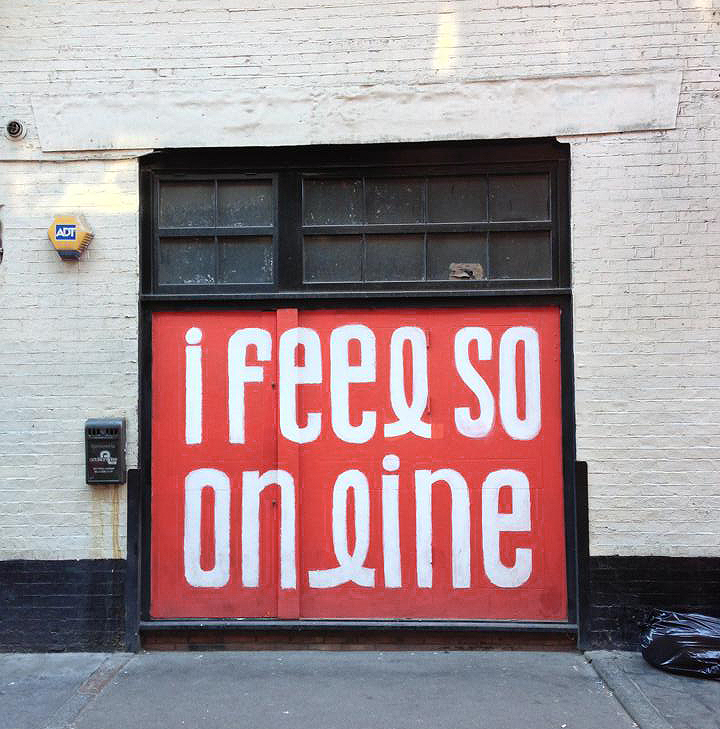
Social Exposure
The more people talking about you, the more relevant you seem. This is marketing 101, but exposure is hyper competitive online and the best way to engage (and control) your exposure is to participate and shape the conversations that you want to be a part of. By giving people specific reasons to mention you in a natural, positive way, you're subtly reinforcing the overall perception of yourself online.
This leads me to my next point:
Opening Doors to New Conversations
By participating in conversations online you're showing your audience and potential customers that you genuinely care about them and their opinions beyond just what you have to offer them. By doing this, you're giving them a reason to respond to you, care about what you have to say, and to endorse you in the future.
For example, most of the conversations that I have online have nothing to do with my personal brand or my work. Most of it is fluffy, lighthearted, and funny. Sure, I participate in online conversations and dedicated Q&A's about content marketing and social media, but by being an actual person online I'm opening myself to be a part of multiple types of conversations, some of which may lead to opportunities to collaborate and many of which paint me (and my work) in a positive light.
Exposure to a Niche Audience
Do you love cat videos? Are you obsessed with shopping for vintage teak furniture? Whatever you're into, make a point to post, share and participate in discussions which showcase the fact that you're a well-rounded, actual person, not just a marketer trying to convert everything that you touch into a contract or sale.
Case in point: this blog. I could talk about stuff like content marketing and social media until the cows come home, but I'm also a real person who spends time with her friends, learns new things, has anxieties, and even writes the occasional poem or two.
By showcasing these sides of my personality I seem far less one-dimensional than what people might otherwise assume when reading my words through a computer screen. People respond well to other people, not to bot-like interactions which are over as soon as you hit the 'Send' button on your reply.
Additionally, by exposing yourself to audiences who might not otherwise have been your "target audience" you open yourself up for tons of creative and collaborative opportunities that may have eluded you otherwise!
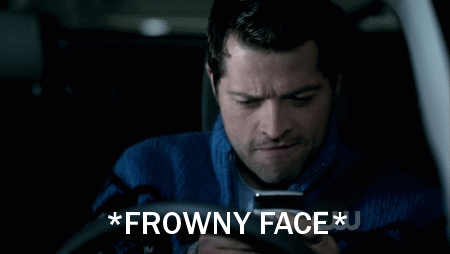
Create a Trusted Reputation
People want to work with me because they see what other people say about me online. Not just my friends (though I always appreciate their kind words) but people who read and share my posts, or clients who have worked with me and felt it to be a mutually beneficial, positive experience.
Whenever a client shares work I've done, or my editor from The Spill Magazine gives me a shout-out on Twitter, these things reinforce that I'm a reliable, hardworking and trustworthy person. They don't have to say it in so many words, but multiple people making general, positive statements increases the odds that someone will see it, and adds to the voices singing your praises online.
In an age heavily reliant on reviews and over-Googling, the more times and places your name comes up in an informal, positive way, the better.
SEO Ranking
This goes without saying: the more people talking about your work and linking to it, the easier it is for people to find you. If nobody's talking about you, nobody will find you and nobody will be able to engage with you because they won't know that you exist.
I'll level with you: getting people to naturally discuss you and your work takes a lot of time, dedication and effort. You have to consider not just why you want people to talk about your work, but why they want to, as well.
To My Family, Who Read This Blog
- by Alyson Shane
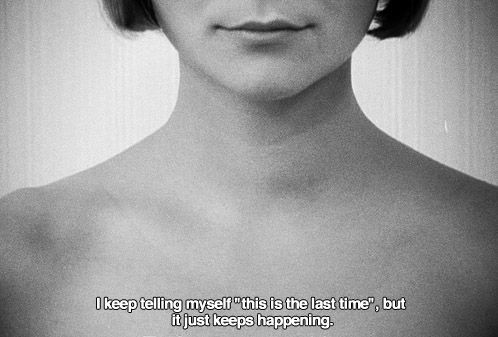
Hello.
I know you're there.
I've been told by a few of you on a couple of occasions that you intermittently read what I post here. That it upsets you. That you don't understand why I do any of this.
That's okay. I don't expect you to.
Because I'm not like any of you. I'm a writer. I find solace in the curves of words, in their permanence, in what is left unsaid between the paragraphs. Some people find comfort in a bottle, or the arms of a lover, but I find it in words.
I don't know how I turned out this way. How I grew up to be such a demonstrably different person than I was ever told, encouraged, expected to be.
But I'm thankful for it.
I'm thankful that I am learning to handle my anxieties and issues in positive, healthy ways; I'm thankful that I have people around me who support me; I'm thankful that I have this blog, my little corner of the internet, where I can pour out my heart and soul and thoughts when they overwhelm me.
I want you to know that I'm working on learning to accept that you can't and won't be the people that I so desperately need you to be. It's hard, but it's something that I will need to work on coming to terms with. If I spend my whole life expecting you to change then I'll never be happy.
The only person whose growth I can control is my own, and I'm doing my best.
Part of that includes writing here. Of being honest about my struggles and challenges, and the steps that I'm taking to overcome them.
Lots of people go through similar situations, and if my words are able to help a single person feel like they're not alone, or encourages them to get the help that they need, then I have a responsibility as a writer to put myself out here. Even if it means upsetting you.
As I said: I don't expect you to understand.
I do expect you to continue to ignore me; to continue to pretend like nothing is wrong and I'm just delusional or making up the fact that I have anxiety or issues with trust, confidence and self-worth. I expect you to continue to deny your roles in causing these issues, to continue to keep me at arm's length because it's easier to ignore me than it is to face the things about yourselves that make you uncomfortable.
But I know you read this blog. So I'm telling you that it's okay.
I forgive you.
(At least, I'm working on it.)

